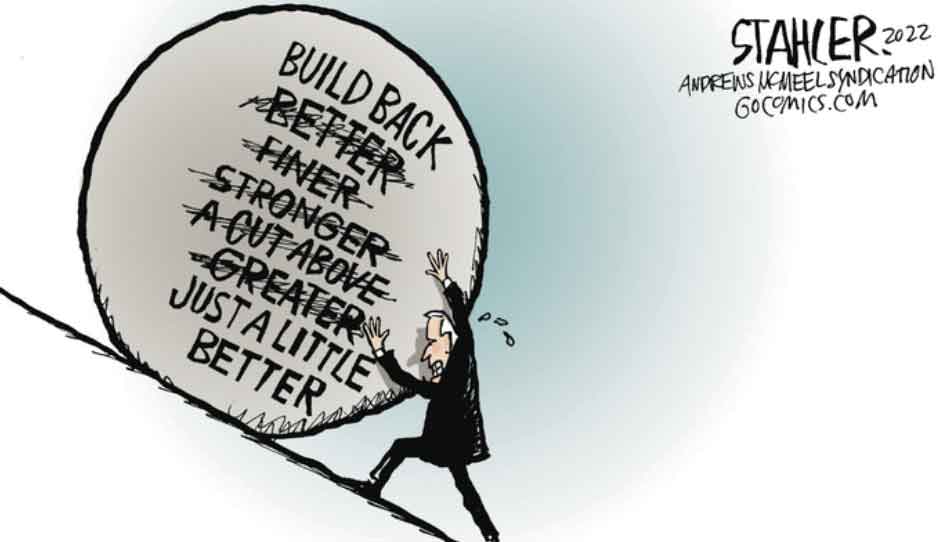
He wants to get back on top, which is a good idea, and he can be proud that he signed a law to spend more than half a trillion dollars on new roads, bridges, buildings and other projects over the next several years. But it's a bad idea to require that all those construction materials — "lumber, glass, drywall, fiber-optic cable," he noted last week — be made in America.
The success of the Bipartisan Infrastructure Law, which Biden signed in 2021, will be measured not by how much money it spends but by how much stuff it builds. The president likes to talk about repairing highways, removing lead toxins from the water supply, installing charging stations for electric cars, and upgrading America's passenger rail. Tying all these projects to a protectionist agenda for construction material just ensures the US will get less of them than it otherwise could.
America's existing infrastructure costs are far too high — Biden's chief economist at OMB, Zachary Liscow, is actually an expert in this topic — and the White House should be looking at ways to reduce red tape and ease projects rather than add new layers of cost and bureaucracy.
Worst of all, though, Biden's approach entails accepting higher costs for no real reason.
Politicians have traditionally promoted inefficient protectionist policies in an effort to create jobs. Your mileage may vary on the wisdom of that strategy during an economic downturn. But as Biden himself bragged at some length during his State of the Union address, jobs are not currently scarce in the US.
Unemployment is at 3.4%, a 50-year low. Again, that's an extraordinary achievement. But it means that job creation is now superfluous or even harmful as a policy objective. Every worker pulled into logging or drywall is a worker pulled out of another field like trucking. Every ton of US-made steel sent to bridge projects is a ton diverted away from building apartments.
And the cost pressure will grow not just on the infrastructure projects themselves but on the broader economy. That doesn't mean a return to the kind of alarming inflation of 2022, but it does mean even more pressure on the Federal Reserve to raise interest rates in order to keep inflation tapped. With prices still rising considerably faster than the 2% target and the labor market still running hot, there's no way Fed Chair Jerome Powell is going to let it run hotter in response to federal makework policies.
That's not to say it's impossible to further juice economic growth, job creation or wages. But it should be done through productivity gains. As Biden argues, improving America's infrastructure would help here. But the goal should be to complete those projects as quickly and cheaply as possible in order to maximize the benefits.
To be clear, one doesn't need to be a dogmatic free trader to see a problem here.
One of the hallmarks of Biden-era policymaking has been a revival of interest in "industrial policy," specific efforts to cultivate the US as the home of industries of the future. Each of Biden's hallmark pieces of legislation has involved industrial-policy elements. The infrastructure bill tries to foster the US as home to a vibrant electric vehicle manufacturing industry. The Inflation Reduction Act increases emphasis on EVs while adding support for advanced nuclear, carbon capture, geothermal and renewable energy. The CHIPS and Science Act focuses on semiconductors.
These efforts might flop. Or they might succeed at a cost future generations deem to have been too high. But the aspiration is clear, and they might succeed. The US is already operating at the frontier of global technology and productivity, and it needs some theory of how it's going to push forward. Biden's theory makes sense.
Lumber, glass, drywall and fiber-optic cables are a very awkward fit for this vision. These are not cutting-edge industries or the products of the future.
This has in fact always been the most sensible concern about industrial policy: That if you don't deliver a simplistic "trade is good" message to politicians and the public, you'll end up with willy-nilly protectionism. I don't like those kind of defeatist arguments. The main thrusts of Bidenomics — full employment, growth in strategic industries, and a focus on innovation — make a lot of sense. But to deliver on the promise of his first two years in office, Biden needs to implement them properly.
That means less of a focus on job creation and more rigorous thinking about which industries to promote as the future of the economy. And in that analysis, it's unlikely that construction materials will come out ahead of cutting-edge technologies.
(COMMENT, BELOW)
Previously:
• 01/25/23: Manchin's plan to avert a debt crisis just might work
• 01/10/23: George Santos doesn't deserve to be kicked out of Congress
• 10/03/22 Ron DeSantis and the rise of free-lunch conservatism
• 09/07/22 A debate over the deficit is just what America needs
• 09/03/22 College tuition is too high, but it isn't actually rising
• 08/02/22 Dems need more Manchins
• 06/30/22 Biden 2024? America needs to know now
• 05/30/22 The flaw in the progressive stance on guns
• 05/18/22 Biden can do much more to fight inflation
• 04/05/22 We'll miss globalization when it's gone
• 12/27/21 How 2021 could have been different for Biden
• 11/09/21 Where have you gone, Joe Biden of the primaries?
• 10/05/21What Dems need: More short-term thinking
• 06/02/21
Shh, Congress IS working
Matthew Yglesias writes the Slow Boring blog and newsletter. A co-founder of Vox and a former columnist for Slate, he is also host of "The Weeds" podcast and is the author, most recently, of "One Billion Americans."


 Contact The Editor
Contact The Editor
 Articles By This Author
Articles By This Author